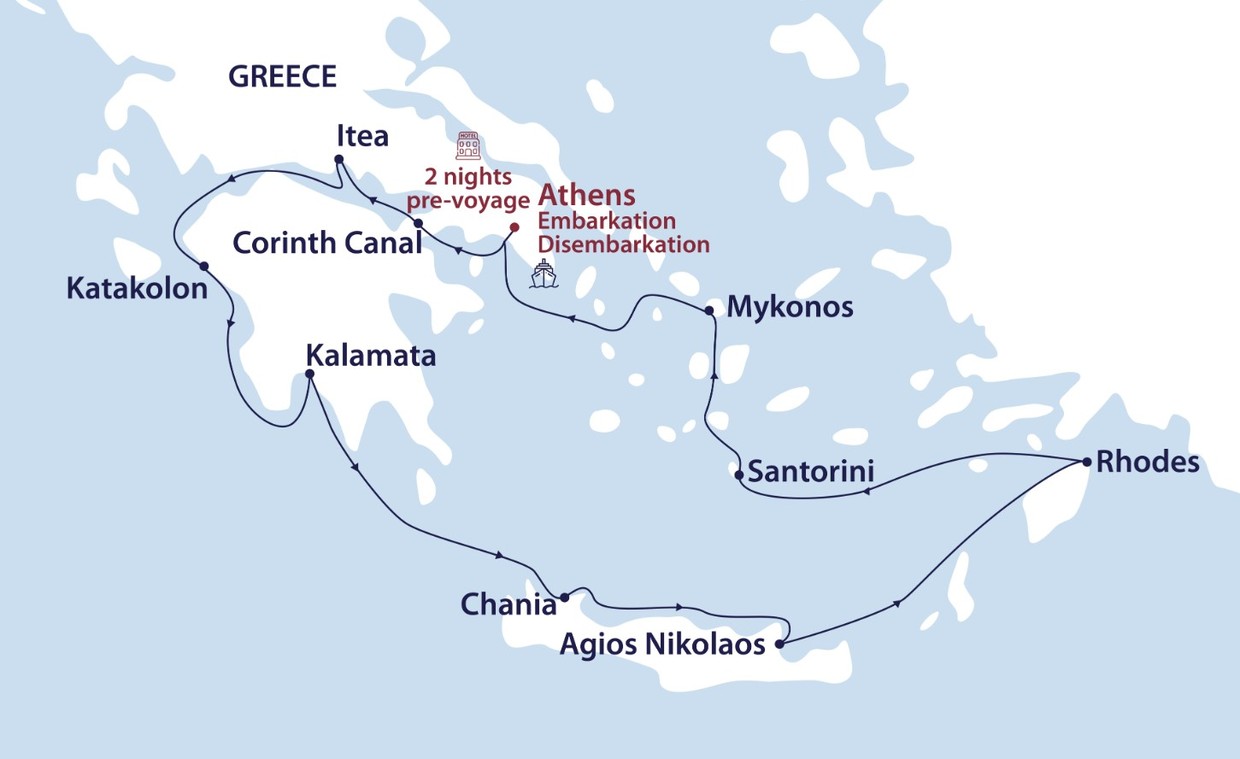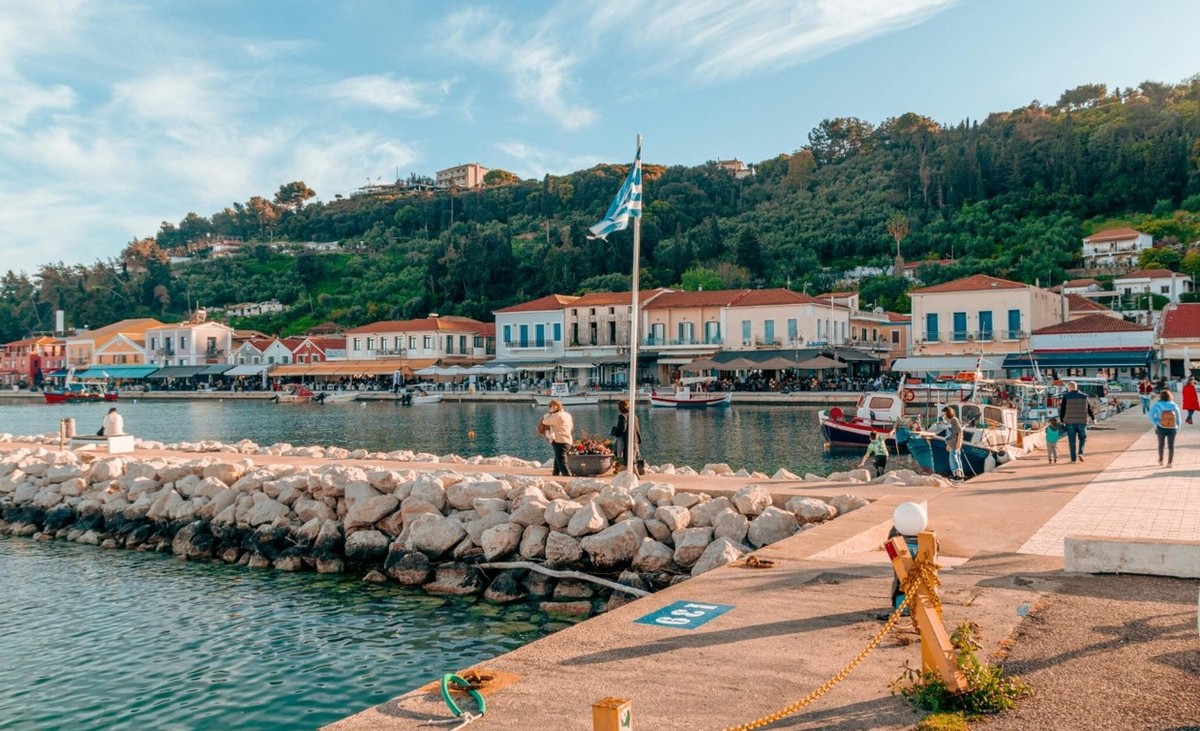
Welcome to Aurora Expeditions’ It’s All Greek to Me
Famed as the birthplace of democracy, Alexander the Great and Plato, Greece offers a plethora of iconic experiences for all the senses. From the resonant melodies of the bouzouki to the majestic Doric columns of the Parthenon and the anise-laden allure of ouzo, our journey encapsulates ‘everything Greek’. Explore legendary sites like Olympia, the Oracle of Delphi, and the ancient wonders of Crete. Savour the flavours of the Mediterranean diet and immerse yourself in the vibrant traditions of Greek music, dance and hospitality. Visit the sun-kissed islands of Mykonos and Santorini and wander the historical heart of Rhodes. There will be time to relax harbourside as fishermen tend their nets, join the locals in the lively sirtaki dance and savour sunsets over an azure Aegean horizon. One thing is certain: after this voyage, you’ll honestly be able to say, ‘It’s all Greek to me.’
- Visit ancient UNESCO World Heritage Sites, from the legendary birthplace of the Olympic Games at Olympia to the pilgrimage site of Delphi, and the Old Town of Rhodes
- Taste the flavours of Greece, from savouring locally crafted olive oil, to feasting on traditional delicacies straight from farm to table
- Discover the allure of Mykonos and Santorini steeped in Greek mythology and embodying the ‘Greek’ island way of life
- Relax on sun-kissed Crete, wander picturesque villages, and delve into Minoan culture
Prices quoted here are often dependent on currency fluctuations. Please check with (01432 507450 or info@small-cruise-ships.com) for the very latest price, which may well be cheaper than the one advertised here.
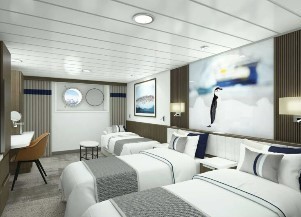
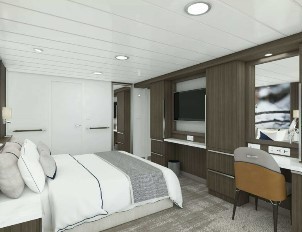
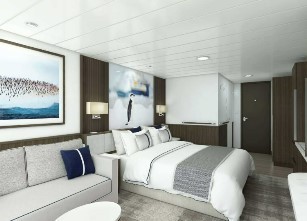
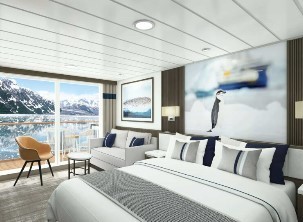
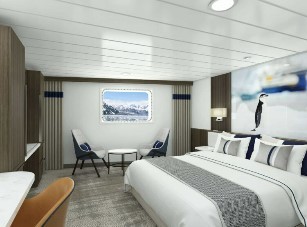
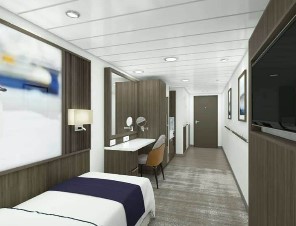
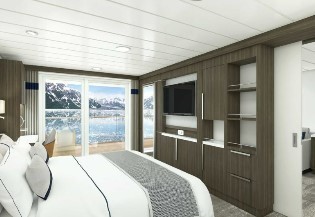
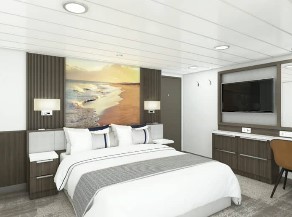
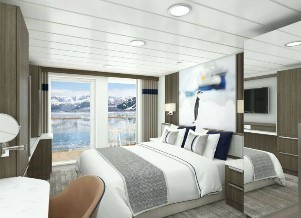
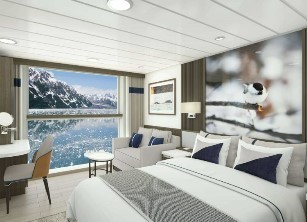
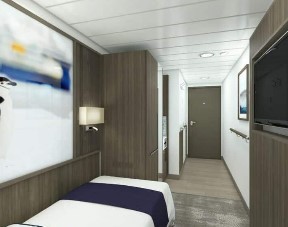
Welcome to Athens. On arrival at Athens airport, make your way to the Arrivals Hall, to meet our representative, followed by a transfer to our group hotel. At the hotel, visit our hospitality desk in the lobby to meet our team who will provide you with useful information regarding pre-embarkation procedures and about your time in Athens. You will also receive cabin tags for your luggage. Please clearly label the tags with your name and your cabin number on the ship. This evening offers time to relax in preparation for tomorrow.
Accommodation: Athens Hotel
After breakfast, enjoy a morning ‘Your Choice’ experience. Rejoin the coach to return to our hotel or take a stroll to the city’s popular Plaka precinct, nearby. A series of streets and laneways filled with restaurants, cafes and shops, it is the perfect place to grab a bite to eat or shop for gifts to take home (lunch own expense). This evening, we celebrate the start to our journey in true Greek style, with a Welcome Event.
With a history stretching back 3,500 years, Athens is a city rich with stories. Known as the ‘cradle of civilization’ and celebrated as the birthplace of democracy, philosophy, and theatre, Athens seamlessly blends its storied past with its lively present. This bustling metropolis, home to three million residents, is dotted with ancient landmarks like temples, iconic columns, and former city centres. Athens' influence in antiquity reached far beyond its borders, ushering in a Golden Age of political debate, education, and philosophy, and hosting figures such as Socrates, Plato, and Aristotle. The democratic principles developed here laid the foundation for modern governance systems around the world.
However, Athens is more than just an ancient relic. Having weathered numerous invasions, it has evolved into a city with rich architectural styles, culinary traditions, and cultural practices. Whether you're exploring ancient ruins or savouring modern Greek cuisine, Athens offers a fascinating journey through history, inviting travellers from all corners of the globe to experience its enduring charm.
Personalise your exploration with our included ‘Your Choice’ experiences.
Option 1 – Morning experience: A Taste of Athens
For foodie fans, travellers who have visited Athens before, and those who enjoy a personal view of Athens, this experience is perfect. We begin our guided walk at Syntagma Square, where Greece’s Parliament building stands, guarded by traditionally attired Evzone guards. Our local expert warmly welcomes you to their home city, leading you on an intriguing walking tour through Athens’ historical areas. With passion and knowledge, they unveil authentic Athens and its secrets.
Stroll through Plaka, the charming ‘old quarter’ of Athens nestled at the base of the Acropolis. Admire its eclectic neoclassical architecture, picturesque alleys, and inviting tavernas. Pause at a colourful local cafe to indulge in Greek delicacies such as olives, fragrant cheeses and cured meats.
Continue through Monastir Aki, famous for its bustling flea market and vibrant shops brimming with local crafts and souvenirs. From there, we wander to Thission, offering the best panoramic views of the Acropolis, Ancient Agora, and the majestic Temple of Hephaestus. Here, we treat ourselves to a traditional Greek coffee, accompanied perhaps by a sweet delight like baklava, a favourite among Greeks for its rich layers of pastry, nuts and honey. Our morning offers us a taste of this fascinating city.
Option 2 – Morning experience: Classic Athens
This comprehensive tour combines a visit to the Acropolis with the city’s major landmarks. Begin with a view of the Greek parliament at Syntagma Square, once a royal residence, where the iconic Evzones still stand guard in traditional attire. Next, enjoy a brief photo stop at the Panathenaic Stadium, the site of the first modern Olympic Games in 1896, where athletes revived the ancient Olympic spirit.
Continue past the Temple of Zeus and the Zappeion and view the National Library and University of Athens before a scenic drive to the Acropolis of Athens, a UNESCO World Heritage Site. Built in the 5th century BCE, the Acropolis served as a citadel and religious centre dedicated to Athena, the city’s patron goddess. Explore remarkable structures like the Parthenon, Propylaia, Erechtheion, and the Temple of Athena Nike, showcasing the grandeur of Ancient Greece.
Perched high above the city, the Acropolis is not only an architectural marvel, but also a symbol of the birthplace of democracy. This ancient citadel stands as a testament to the enduring legacy of Greek culture and ideals, representing advancements in art, architecture and political thought that originated in Athens. Feel the essence of civic pride and religious devotion in ancient Greek society, at the city’s centre for political and cultural life. The Parthenon exemplifies the height of classical Greek architecture, adorned with Doric columns and intricate sculptures. Built under the leadership of Pericles, the Parthenon symbolised the city’s wealth and power, with friezes and statues depicting various mythological scenes.
After touring the Acropolis, take a short walk to the Acropolis Museum. This modern museum houses over 3,000 artefacts from the Athenian Acropolis, offering unique insights into ancient Greek life and including an archaeological excavation beneath it. (*Please note: Entrance time to the Acropolis is a local government stipulated time slot. The sequence of the above itinerary may change once the specific time slot is allocated.)
Rejoin the coach for a short drive to the hotel or take a stroll to the city’s popular Plaka precinct nearby. A series of streets and laneways filled with restaurants, cafes and shops, it is the perfect place to grab a bite to eat or shop for gifts to take home (lunch own expense).
Option 3 – Morning experience: A Fetish for Feta
Do you have a fetish for feta or go mad over moussaka? Don your apron and dive into an authentic Greek culinary experience. You’ll be in groups, with each group responsible for different aspects of meal preparation. Learn the secrets behind some of Greece’s most beloved dishes as you bake bread, prep ingredients, and cook under the guidance of passionate local chefs. They will share their expertise, making the class both fun and informative. Afterwards, around the table, savour your creations with fellow participants, enjoying the fruits of your labour. This delicious experience not only fills your stomach but also leaves you with lasting memories – and a passion for the Mediterranean lifestyle.
Accommodation: Athens Hotel
Meals: Breakfast, Welcome Event canapés
Enjoy a leisurely morning in Athens. Revisit your favourite sites, explore the city’s markets and shops, or discover hidden treasures on an independent exploration. Athens’ extensive metro network makes it easy to navigate the city, while the warm Greek hospitality ensures you are never far from helpful advice on how to make the most of your time.
Mid-afternoon, we transfer from our hotel to the port of Piraeus to board the Douglas Mawson and sail towards the famed Corinth Canal. This evening, we enjoy a ‘Welcome Aboard’ dinner where we meet our crew and onboard team.
Meals: Breakfast, Dinner onboard
We wake this morning at the entrance to one of the world’s engineering wonders, the Corinth Canal. This narrow waterway connects the Gulf of Corinth with the Saronic Gulf in the Aegean Sea, cutting through the Isthmus of Corinth and saving vessels a significant 700-kilometre journey around the Peloponnese peninsula. Stretching 6.4 kilometres and only 21 metres wide at its base, the Corinth Canal is one of the narrowest lock-free canals in the world. Its towering limestone walls, reaching heights of up to 78 metres, create a dramatic passage for vessels, which almost touch its sides as they sail its path.
The concept of cutting a canal through the isthmus dates to ancient times, with plans proposed by Periander of Corinth in the 7th century BCE. Construction finally began under Roman Emperor Nero, only to halt upon his death. It was not until 1893 the canal was finally completed. Its construction was a monumental effort, involving the excavation of millions of cubic metres of earth and rock, all dug at sea level. It stands as a remarkable achievement in engineering and continues to be a key route for maritime traffic, enhancing Greece’s role as a central hub in the Mediterranean.
Exiting the canal, we sail the Gulf of Corinth to Itea where our afternoon offers a glimpse into the life of the early Greeks, with a visit to the former city of Delphi. Our local guides tell tales of pilgrimage, sacrifice and early faiths as we take a literal step into the world of ancient Greece.
Revered throughout antiquity as a sacred site where pilgrims could glimpse the future, the Oracle of Delphi cast cryptic prophecies for over a millennium. Dubbed the ‘navel of the world’ for its pivotal position in the Greek realm, Delphi drew pilgrims from all sectors of society, shaping critical decisions, from civic politics to personal destinies. Perched dramatically on the slopes of Mount Parnassus, the Oracle was esteemed as a direct conduit to the divine realm of Apollo – the sun god. Revered for his beauty and creative prowess, Apollo symbolised order and harmony. As a result, Delphi became integral to Greek identity, reflecting its religious, cultural, and political life. It was a unifying site where people from various city-states gathered, fostering a sense of shared Hellenic heritage.
Our journey leads us to the very site of the Oracle, alongside the opulent Treasury of the Athenians – a testament to offerings made. We pause at the ancient theatre, host to the prestigious Pythian Games, and the Castalian Spring, where pilgrims purified themselves before seeking counsel.
Today, Delphi stands as a UNESCO World Heritage Site, its influence enduring through the annals of literature, history, and art. It remains a profound emblem of ancient wisdom and cultural legacy, cherished by Greece as a bridge to its storied past.
Returning to the ship we sail to Greece’s classic, the Peloponnese Peninsular.
Today, our ‘Your Choice’ experiences are truly Olympic in scope, offering you two classic Greek treats. A brief ten-minute walk from our berth, finds a variety of shops and restaurants to explore. Just a short distance away, the popular pebbled Plakes Beach awaits, and the sandy stretch of Agios Andreas Beach is a mere five-minute taxi ride.
Steeped in maritime history, the picturesque port town of Katakolon remains the gateway to the ancient site of Olympia, and our port for today. One of the most important sanctuaries in ancient Greece, Olympia was dedicated to Zeus, the king of the gods. Every four years, athletes from across the Greek world gathered here to compete in various sports, honouring Zeus and fostering unity among the city states. The busy port town of Katakolon itself is a hub of activity, with its quaint streets lined with shops and cafes, while the Katakolon Lighthouse and the Museum of Ancient Greek Technology offer insights into the region’s rich history.
Personalise your exploration with our included ‘Your Choice’ experiences.
Option 1 – Morning experience: An Olympic Encounter
Renowned as the birthplace of the ancient Olympic Games, the 8th-century BCE site of Olympia was the Greek world’s most revered religious sanctuary, dedicated to Zeus, the king of the gods. The site housed numerous temples, altars, and sporting facilities, with the Temple of Zeus featuring a 40-foot statue of Zeus sitting on an elaborate cedarwood throne adorned with ebony, ivory, gold and precious stones. This statue was one of the Seven Wonders of the Ancient World.
Held every four years from 776 BCE to 393 CE, the games at Olympia attracted athletes from all over the Greek world. Over 45,000 spectators cheered on their sporting heroes, who competed in a range of sports such as running, wrestling, boxing, and chariot racing. The games were not only a display of physical prowess, but also a celebration of Greek unity and religious devotion. Victors were awarded olive wreaths and gained immense prestige and honour in their home cities.
Today, Olympia continues to influence the modern Olympic Games. Many of the ancient sports, lost throughout the centuries, were revived in 1896 by Pierre de Coubertin’s ‘Modern Olympics’. The Olympic flame, a symbol of peace and unity, is lit in a ceremony at the ancient site of Olympia before every modern Olympics, and then relayed to the host city. This tradition underscores the connection between the ancient and modern games. A visit to Olympia is a lesson not only in its historical and archaeological importance, but also in its lasting impact on global culture through the ongoing tradition of the Olympic Games. The site fosters a spirit of unity and excellence that resonates nearly 3,000 years after those first games. Our local guide brings the story of Olympia to life with tales of sporting heroes, revered gods, and generations of families who have lived on this land. The museum is a short walk from the site and contains the 4th-century BCE statue of Hermes by Praxiteles, plus several finds from the excavations, including Paeonius’ Nike of Victory, who according to Olympic legend, came down from the heavens to hand a palm leaf to every winner.
Option 2 – Half day experience: Farm and Feast
Nestled among olive trees and vineyards, this 30-acre, family-owned estate lies approximately 45 minutes from the port in the picturesque region of Floka near Ancient Olympia. Embracing traditional farming methods and organic cultivation passed down through generations, the estate exudes a timeless charm. Upon arrival, guests are greeted with a classic shot of ouzo, a beloved Greek spirit celebrated for its distinct anise flavour and potent clarity. Integral to Greek culture, ouzo is often savoured as an aperitif or paired with meze (small dishes).
Accompanying the ouzo is a freshly baked local pie, served as our hosts share insights into the estate’s non-mechanised olive-harvesting techniques. Delve into a captivating history of olive oil and its revered properties, underscoring the profound connection between Greek cuisine and the land. Enjoy a leisurely stroll around the farm, interacting with the resident animals. Later, we gather in the charming stone farmhouse, now transformed into a cosy dining area. Here, indulge in a feast of traditional flavours sourced from the farm and the local area, complemented by the estate’s wine drawn straight from large oak barrels. Our visit culminates in true Greek style with a lively sirtaki dance. Join in the celebration as guests and newfound friends of the estate embrace the joyous spirit of Opa!
Celebrated for its famous olives, Kalamata is the capital of the Messenia region. Having withstood various civilisations, including the Byzantines, Franks, Venetians, and Ottomans, it invites us to explore a slice of the Peloponnese Peninsula. Today its acts as our gateway to a coastline of Medieval castles and a chance to savour the local olives. The renowned black Kalamata olives are a must-try, and visiting a local producer to sample these olives and pick up a bottle of extra virgin olive oil is a must. Many local producers are still small-scale and family-run, offering an authentic experience.
Alternatively, you can explore Kalamata’s vibrant central market. Its Saturday, with hundreds of vendors and producers setting up stalls to offer a wide range of fruits and vegetables, including Kalamata olives. You’ll also find a variety of local delicacies, such as sfela cheese (a semi-hard cheese made from sheep or cow milk), pasteli, honey, lalagia (fried dough), and Poliani apples.
This vibrant harbour city is dominated by a rocky outcrop, which, although formerly a Greek Argos, now hosts the Frankish-built 13th-century Castle of Isabeau. The castle offers dramatic panoramic views across the Messenian Gulf. At its base, the Palia Poli, or Old City, provides an eclectic open-air venue for theatre, music, and dance shows. The city’s charm lies in its blend of historical allure and contemporary vibe. It continues to thrive as a centre of agriculture, with its famed almond-shaped olives exported worldwide, and locally produced olive oil coveted as a symbol of Greek culinary expertise.
Personalise your exploration with our included ‘Your Choice’ experiences.
Option 1 – Morning experience: Ancient Messini and Kalamata Olives
Our morning begins with a journey into the ancient past and present as we explore the ruins of Messini, visit the village of Androusa, and discover the essence of the kalamata olive. Nestled below the village of Mavromati, the extensive ruins of Messini sprawl across a hillside, comparable in scope to sites like Delphi and Epidaurus. Founded around the 4th century BCE, Ancient Messini thrived as a prominent city-state for 350 years under Spartan rule before gaining independence. Explore its expansive theatre and formidable city walls, offering an insight to the city’s former political, cultural and religious life. Further down the hill, we find a large stadium, surrounded by a forest of restored columns. Invading Romans transformed part of the athletics track into a gladiator arena, complete with VIP seats adorned with lion backs and paw-shaped legs. Nearby, by the rebuilt gate of the immense gymnasium, discover round holes in stone slabs – Roman public toilets ingeniously positioned over a stream.
No visit to Kalamata is complete without a nod to its famed olives. Afterward, immerse yourself in the timeless tradition of olive oil production in Androusa village. Visit a traditional olive mill to observe the meticulous process from olive cultivation to oil extraction, followed by an exclusive tasting session to savour the rich flavours of locally crafted olive oil, celebrated for its quality and distinctive Mediterranean character.
Option 2 – Morning experience: Medieval Methoni and Pylos
Our drive follows the scenic coast for an exploration of two magnificent Venetian castles and their waterfront villages. Methoni Castle, built in the early 13th century on a rocky promontory, ranks among the Mediterranean’s largest. It boasts a stone bridge with 14 arches, and houses relics of Ottoman bathhouses and immured reliefs. Adjacent is Bourtzi, once a prison during Turkish rule.
Pylos Castle, constructed by the Turks in 1573, showcases 16th-century military architecture fortified by European engineers against land and sea attacks. Venetian enhancements from 1686 to 1715 added the Zematistra gateway, Evdomos and Santa Maria bastions, and cannon embrasures on the south wall, flanked by towers like the Makrygiannis Tower. The castle encloses a hexagonal citadel with a moat.
Immersing ourselves in the rich history of these Venetian fortresses and experiencing their strategic significance is a true insight into the everlasting importance of the coastline of the Peloponnese.
Crete, the largest of the Greek islands hosts our journey for the next two days. This land of myths, history, and natural wonders is steeped in ancient mythology. In fact, Crete is believed to be the birthplace of Zeus, king of the gods. Its labyrinthine ruins resonate with tales of the Minotaur and King Minos. The Minoans, Europe’s oldest civilisation, have left behind the formidable Palace of Knossos, now a UNESCO World Heritage site. Crete’s landscape is equally captivating, with rugged mountains, fertile plains, and idyllic beaches kissed by azure waters. Charming villages dot the countryside, where time seems to stand still amidst whitewashed buildings adorned with vibrant bougainvillea. Whether exploring ancient ruins, enjoying the island’s rugged landscapes or simply soaking in the island’s laid-back atmosphere, Crete offers a captivating experience for all who visit.
Our first stop is Souda, the bustling port of Chania, known for its eclectic Old Town and scenic surrounding plains. This area provides a range of interesting experiences to explore.
Personalise your exploration with our included ‘Your Choice’ experiences.
Option 1 – Morning experience: Walk Chania Old Town and Artisan Demonstration
Starting at the port of Chania, our journey takes us through the Akrotiri Peninsula to Chania Old Town, built upon an ancient Minoan settlement dating back to 3600 BC. This historic city has witnessed the reigns of Byzantines, Arabs, Venetians, and Ottomans before uniting with Greece. Explore Chania Old Town on a guided walking tour, where millennia of Greek history unfold amid Hellenistic walls, Ottoman bathhouses, and Venetian bastions.
Driving through the city, we arrive in Chania’s Old Town, where our local guide captivates us with stories of the city’s past and present. Wander through narrow cobblestone alleys lined with shops, cafés, and restaurants, each district revealing its unique history and character rooted in the ancient city of Kydonia. Discover the influences of Muslim, Jewish, and Christian cultures interwoven throughout Chania’s eclectic past. Along the way, experience a unique pottery demonstration, offering a hands-on glimpse into Chania’s artisanal heritage and enriching your exploration of this storied city.
Option 2 – Morning experience: The Holocaust of Arkadi
Unlike any other site on Crete, the Monastery of Arkadi offers a profound insight into the island's relentless determination to remain true to its identity. Perched on a plateau near Mount Psiloritis, this historic monastery stands as a powerful symbol of Crete’s quest for freedom from Ottoman rule. Likely founded in the early 14th century, the monastery was transformed into a priory in 1572. During the Cretan uprising against the Ottomans, Arkadi became a revolutionary stronghold. On November 9th, 1866, 15,000 Ottoman troops led by Suleyman the Magnificent surrounded the monastery, laying siege with 30 cannons. Despite a valiant defense by the 350 armed men, and 600 women and children who lived nearby, the monastery eventually fell after intense fighting. In a desperate act of defiance, the gunpowder storage was ignited, leading to a massacre now known as the Holocaust of Arkadi.
Today, the Monastery of Arkadi invites visitors to explore its monumental site, which symbolises Crete's enduring spirit. On a locally guided tour we discover its ornate church, and delve into the small museum where Byzantine icons, religious artifacts, and poignant relics from the tragic events of the Holocaust of Arkadi vividly bring the island’s dramatic past to life.
Option 3 – Morning / lunch experience: Cretian Agrofarm experience
Today, we journey to the rural Rethymno area. Our destination is an Agrofram that showcases centuries-old farming methods amidst traditional surroundings with stone outhouses, vineyards, and organic gardens. At the farm, our hosts will introduce us to their livestock while demonstrating the traditional farming techniques still in use today. You will see where they produce fragrant cheeses, the vat where grapes are tread by hand (or rather, feet) in the autumn, and the wine press where we can sample organic wine.
After lighting the wood-burning stove, we will try our hand at traditional bread making, crafting our own bread shapes to enjoy hot from the oven with olive oil, just as the locals do. Under a shady pergola with views over the olive groves down to the sea, we will savour a sumptuous organic lunch with organic wine. The lunch menu typically includes Sfougato (traditional pie with free-range eggs), stuffed vegetables with feta, hand-picked salad, Myzithropitakia with honey, fresh seasonal fruits, Greek coffee, and red and white organic wine. Additionally, we’ll learn about Raki, a traditional spirit distilled from the remnants of grapes used in winemaking. This potent drink is often enjoyed as a symbol of hospitality and celebration. (Note: Your experience may differ from the itinerary above as farms are chosen subject to availability. Each with its own unique produce and livestock.)
Our second stop on Crete is the renowned city of Agios Nikolaos, a seaside town rich in historical charm. The town’s centerpiece, Voulismeni Lake, is steeped in mythology, with ancient legends claiming that the goddesses Athena and Artemis bathed in its serene waters. Surrounded by dramatic red rock formations, the lake connects to the sea via a narrow canal, creating a mythical atmosphere.
Exploring the town’s shops you can find unique traditional Cretian art artifacts, replicas from local archaeological museums, Cretian jewellery, and intricate embroidery. Additionally, local products and delicacies offer a taste of the region’s rich culinary heritage. The town is surrounded by stunning beaches, easily accessible from the downtown area. A popular beach is just a short distance away, offering visitors a perfect spot to relax and soak in the seaside vibe.
Personalise your exploration with our included ‘Your Choice’ experiences.
Option 1 – Morning experience: The Minoan Capital of Knossos
One hour’s drive from Agios Nikolaos we discover the Knossos excavation site, where we meet the fascinating early civilisation of the Minoans. Sir Arthur Evans’ archaeological discoveries unveiled a city dating back to 4000 B.C., revealing the ancient Minoan Kingdom. The Minoans, renowned for their advanced culture, thrived on Crete with sophisticated art, architecture, and maritime trade, shaping the Aegean region’s early history. At Knossos, we explore their Palace, adorned with frescoes, shields, the Hall of the Royal Guard, the King’s Chamber with its alabaster throne, and the Queen’s Apartment. Originally built around 1900 BC, Knossos was rebuilt after earthquakes and catastrophes.
The Minoan civilisation declined following the eruption of Santorini around 1600 BC, which caused widespread devastation across the Aegean. Despite subsequent rebuilding efforts, including the Palace’s reconstruction, Knossos ultimately succumbed to fire around 1400 BC. Our guide illuminates the Minoans’ cultural and technological achievements, offering insight into their religious practices, social structure, and economic prowess.
Option 2 – Morning / lunch experience: Cretian Agrofarm experience
Today, we journey to the Cretian interior. Our destination is an Agrofarm that showcases centuries-old farming methods amidst traditional Cretian surroundings with stone outhouses, vineyards, and organic gardens. At the farm, our hosts will introduce us to their animals while demonstrating the traditional farming techniques still in use today. You will see where they produce fragrant cheeses, the vat where grapes are tread by hand (or rather, feet) in the autumn, and the wine press where we can sample organic wine.
After lighting the wood-burning stove, we will try our hand at traditional bread making, crafting our own bread shapes to enjoy hot from the oven with olive oil, just as the locals do. Under a shady pergola with views over the olive groves down to the sea, we will savour a sumptuous organic lunch with organic wine. The lunch menu typically includes Sfougato (traditional pie with free-range eggs), stuffed vegetables with feta, hand-picked salad, Myzithropitakia with honey, fresh seasonal fruits, Greek coffee, and red and white organic wine. Additionally, we will learn about Raki, a traditional Cretian spirit distilled from the remnants of grapes used in winemaking. This potent drink is often enjoyed as a symbol of hospitality and celebration. (Your experience may differ from the itinerary above as farms are chosen subject to availability. Each with its own unique produce and livestock.)
Option 3 – Half-day experience: A Modern Twist on an Ancient Wine
Our visit to a Cretan vineyard combines traditional winemaking with modern techniques. This family-run operation starts with exceptional grapes nurtured through meticulous vineyard management and artisanal methods. The winemaking process is both refined and minimalist, with most vinification done in double-hulled stainless-steel tanks. Recent innovations in oak fermentation are set to enhance the red wines, which age in oak barrels for 10 months, while roussanne is matured in small oak barrels.
Your journey begins with a walk through the family home gardens, followed by a tour of the production area, wine cellars and bottling facilities. The experience concludes with a tasting of five distinct Cretan wines, accompanied by a mezze plate of local delicacies. Cretan wines, with their deep-rooted history and modern resurgence, offer a unique and flavourful exploration of the island’s rich viticultural heritage.
Popular with culture enthusiasts and beach aficionados alike, Rhodes is the largest and most historically significant of Greece’s Dodecanese islands. Known for its medieval Old Town, a UNESCO World Heritage Site, Rhodes boasts ancient ruins and cobblestone laneways that transport us back to the days of medieval Europe, with two fascinating ‘Your Choice’ experiences on offer this morning, leaving the afternoon free to explore independently before we sail late-afternoon.
The island’s rich history is highlighted by two notable periods. After the Fourth Crusade, the Knights Hospitallers, fleeing Cyprus, were granted the island by Pope Clement V. They ruled for two centuries, constructing the impressive Palace of the Grand Master and fortifying the island. Their rule ended with the arrival of Suleiman the Magnificent, who, despite his conquest, allowed the Knights to leave with all the wealth they could carry. Whether exploring ancient sites or enjoying its sunny beaches, visitors to Rhodes will find a destination on where the past and present weave a fascinating tale.
Personalise your exploration with our included ‘Your Choice’ experiences.
Option 1 – Morning experience: The Knights of St John and Medieval Rhodes
The excursion begins with a short walk from the ship to the entrance of the Old Town, where our local guide leads us through this UNESCO-listed town. The Old Town lies apart from the New Town, sealed like a medieval time capsule behind a double ring of high walls and a deep moat. Nowhere else in the Dodecanese boasts so many layers of architectural history, with ruins and relics of the classical, medieval, Ottoman, and Italian eras intertwined in a maze of twisting alleys.
Entering through the D’Amboise Gate, we visit the Grand Master’s Palace, the most imposing building of medieval Rhodes. The palace and ‘The Street of the Knights,’ built in the 14th century, have remained largely untouched by time. The Knights of Rhodes, also known as the Knights Hospitaller, where a Christian military order granted the island in 1309 by the Byzantine Empire. They fortified Rhodes to defend against Ottoman forces, establishing it as a cultural and trade centre. Despite their defeat by the Ottomans in 1522, their architectural legacy remains. It is one of the rare survivors of the medieval world, standing unscathed as a piece of the past.
Option 2 – Morning experience: The Ancient City of Lindos
A one-hour scenic drive along the East Coast of the island takes us to Lindos. Renowned as the most attractive village on Rhodes, the nearby ancient site boasts significant historical structures, including the Great Stoa, the Temple of Athena Lindia from the 4th century BCE, the ancient theatre, and the remnants of the Temple of Dionysus. The Acropolis, perched atop a sheer rock rising 115 meters above the sea, offers unparalleled views of the sea.
Lindos itself is a medieval village built around the base of the steep rock leading to the Acropolis. As you wander through its narrow, winding streets, you will encounter traditionally built white stone houses adorned with decorated pebble stone floors. Many of these houses date back to the 15th and 16th centuries, providing a glimpse into the village’s storied past.
Historically, Lindos was a significant city-state in ancient Greece, founded by the Dorians in the 10th century BC. It became a major trading centre, flourishing during the Archaic period when its influence extended across the Mediterranean. Lindos is also linked to various myths and legends, including Cleobulus, one of the Seven Sages of Greece, who ruled the city.
As you explore Lindos, you will discover its rich history reflected in the architecture and archaeological remains scattered throughout the village. From its ancient roots to its medieval heritage, Lindos offers a unique journey through time, making it a must-visit destination on the island of Rhodes.
As we arrive at Santorini, it is easy to see why this iconic island is a favourite among travellers. The sheer cliffs soaring above the Aegean Sea are awe-inspiring as we cross the immense crater of a submerged volcano that leads to its shores. Shaped by a cataclysmic eruption 3,600 years ago, Santorini is famed for its striking sunsets and unique caldera views. Named Thira in ancient times, Santorini has always attracted the curious. Its ancient ruins, including the Minoan site of Akrotiri, offer a rich cultural heritage reflected in local cuisine, wine production, vibrant festivals, and artisanal crafts. Whether wandering through the charming streets of Oia or enjoying the unique black sand beaches, Santorini offers a deeply enriching experience that melds history and natural beauty into the ideal Grecian Island.
Personalise your exploration with our included ‘Your Choice’ experiences.
Option 1 – Morning experience: The village of Pygros and Wine Tasting Santorini Style
Ascending Santorini's rocky caldera wall we reach Pyrgos, the highest village on the island, and enjoy breathtaking vistas. Pyrgos, once the capital of Santorini, preserves its traditional charm with narrow, winding streets, whitewashed houses, and blue-domed churches. Explore the remains of the Venetian Kasteli, a testament to the island's medieval period, offering panoramic views of the landscape. Take a guided walking tour through the village's labyrinthine lanes, discovering its unique charm and rich history. Visit the Church of Theotokaki, one of the island's oldest churches. Pyrgos' stunning views and historical significance make it a must-visit destination on Santorini.
Afterwards, a short drive takes us to one of the island’s most acclaimed wineries, where we sample the locally produced wines. Here, we’ll learn about the “kalathies” vines and the unique way locals have been growing grapes for centuries and explore the cave-like cellars housed in beautiful traditional architecture. Following our wine tasting, we continue across the island to the capital of Santorini, Fira. Fira boasts fantastic views over the Caldera and offers an array of tempting boutiques and craft stores. Enjoy leisure time before our cable car ride takes us from Fira to the port below, where we tender back to our ship.
Option 2 – Morning experience: Akotiri, Fira and the village of Oia
Setting off from the port of Athinios, we drive to the ancient site of Akrotiri. This Bronze Age settlement, destroyed by a massive eruption in the 17th century BC, was buried under volcanic ash, which remarkably preserved the entire city. The people of Akrotiri were advanced for their time, with a well-organised society evidenced by their sophisticated infrastructure, vibrant frescoes, and complex urban layout. Its inhabitants had a high standard of living, with access to imported goods from across the Mediterranean. The ruins remained hidden until 1860, when workers quarrying volcanic ash for the Suez Canal uncovered them. The discovery of their homes and artifacts provides valuable insights into their daily lives and societal structure.
Next, our coach takes us to the picturesque village of Oia, home to around 1,000 residents. This charming village is renowned for its immaculate, white-washed houses and blue-domed churches. The residents here live a relaxed and traditional lifestyle surrounded by stunning views across the Aegean. You will have free time to capture stunning photos and explore the quaint streets before we continue to the capital town of Fira, where we wander its narrow alleyways at leisure, before our tour ends with a scenic cable car ride from Fira down to the port, where our tender awaits.
This morning, we arrive at one of Greece’s most renowned islands. The island of Mykonos, with its iconic whitewashed buildings and charming cobblestone lanes, has been a crossroads of cultures for centuries. Renowned for their hospitality, the people of Mykonos excel at making visitors feel at home amid the island’s historical treasures and picturesque landscapes. From ancient ruins to traditional windmills, Mykonos offers a captivating glimpse into a storied past. The local cuisine, festivals and vibrant arts scene reflect a deep cultural heritage, making Mykonos a unique and enriching destination. While recent years have boosted its reputation for vibrant nightlife, bustling beaches, and world-famous beach clubs, there is much more to discover beyond the surface of this famed island. Delve deeper, and you will find a community that embraces tradition, a fact that truly shines when you engage with the locals. Take the time to chat with them, and you will find that the true wealth of Mykonos lies in its people.
Spending time at one of Mykonos’s famous beaches is a popular way to enjoy your day. If this is your preference, we recommend taking a taxi from the port to your chosen beach. Many of Mykonos’ beaches are lined with restaurants, clubs, and hotels, which provide rows of recliners on the section of the beach adjacent to their property. These establishments often offer food and beverages to their beachfront clients and charge a fee for using their facilities. Therefore, be prepared to pay when visiting many of Mykonos’ beaches.
Personalise your exploration with our included ‘Your Choice’ experiences.
Option 1 – Morning experience: Iconic Mykonos
Explore some of Mykonos’ most stunning locations this morning on this locally guided tour. Witness local fishermen with their “kaikis” (traditional fishing boats), admire the quaint private chapels, and marvel at the charming Cycladic architecture. Your first destination is Ano Mera, a quintessential Cycladic village that enchants visitors with its beauty. At its heart lies the historic Panagia Tourliani Monastery, a cultural and spiritual landmark. Ano Mera serves as a gateway to renowned beaches like Elia and Kalafatis. The village’s public square is encircled by a labyrinth of interconnected lanes, where traditional bakeries, cafes, and taverns offer an authentic taste of local life. Next, you will visit Kalafatis Beach, where you can enjoy free time to soak in the stunning blue waters of the Aegean Sea.
The tour continues with a walking tour of Mykonos Town, also known as Chora. This mesmerising town is a maze of narrow streets, characterised by brilliant white buildings adorned with vibrant blue accents. The bustling alleyways are filled with chic boutiques, quaint cafes, and lively tavernas, offering a diverse array of experiences. The iconic windmills, once used to mill grain and a symbol of the island’s agricultural past, stand proudly overlooking the Aegean Sea. The enchanting waterfront area of ‘Little Venice’ blends historical charm and contemporary vibe.
Option 2 – Morning experience: Mythical Delos
More than any island in the Cyclades archipelago, Delos holds immense significance in Greek mythology and history. Revered as the birthplace of Apollo and Artemis, this ancient land was a paramount religious and cultural centre. Delos thrived from around 900 BC to AD 100, evolving from a sacred shrine to a bustling commercial hub. However, its decline began after repeated attacks by pirates in the 1st century BC and the eventual shift of trade routes, leading to its abandonment. Today, Delos is a UNESCO World Heritage Site, boasting some of the most extensive excavations in the Mediterranean, with ongoing archaeological work still taking place.
Located fourteen kilometres off the coast of Mykonos, a thirty-minute boat ride transports us to this historical treasure. We immerse ourselves in the remnants of its ancient civilization, strolling through the sacred Agora and along the iconic Terrace of the Lions, while our guide will bring this ancient city to life. Whether you are a history enthusiast or simply enjoy a good story, Delos promises a mesmerising experience unlike any other. Upon returning to Mykonos, the tour continues with a walking tour of Mykonos Town, where we explore the Matoyiannia area and visit the famous windmills before returning to our ship.
As we say goodbye to Mykonos, we enjoy a Farewell dinner onboard while heading towards the Greek mainland. With everything we've experienced, it really does feel like 'It’s all Greek to me.'
After breakfast, disembark the ship and bid farewell to your fellow passengers before being transferred to Athens airport for your onward journey.
We strongly recommend scheduling your departure for after 1:00 pm today to ensure you have sufficient time to catch your flight.
Itineraries are subject to change.
Douglas Mawson
Vessel Type: Small Ship Expedition
Passenger Capacity: 154
Lenght: 104.4 m
Built: 2025
Designed for global discovery
Adventure has a new name. Setting sail in 2025, our new state-of-the-art ship, the Douglas Mawson, is the last in a line of purpose-built vessels that have redefined small ship expedition cruising.
Named after the legendary Australian geologist and explorer, our new small ship embodies Mawson’s pioneering spirit and is designed for global discovery. Featuring the revolutionary Ulstein X-BOW® and purpose-built with enhanced sustainability features, it takes on average 154 adventurers to the world’s wildest places in smooth, quiet comfort. It boasts our most extensive range of cabins yet, including a range of single cabins.
The Douglas Mawson features a host of amenities to help you connect with like-minded travellers and elevate your time onboard our floating base camp for adventure. After a long day of exploring, head to the back deck to swim in the heated outdoor swimming pool, find a sun bed to read on, or soak in one of two Jacuzzis. Work up a sweat in the gym before unwinding in the sauna, resolve to learn something new in the Citizen Science Centre, then enjoy a delicious meal with new and old friends in one of two restaurants. Or, with multiple observation areas throughout the ship, simply relax in comfort while you keep watch for wildlife or incredible landscapes unfold before you.
While enjoying the luxurious amenities onboard, you can rest assured that our aim to get you off the ship to explore the natural environment as much as possible through our unique activities program remains unchanged.
Newest Ulstein X-BOW®
The Douglas Mawson features the newest streamlined Ulstein X-BOW®, designed for global discovery. The revolutionary design cuts through the swell, offering unrivalled stability on ocean crossings and helping to reduce fuel consumption. It’s just one of the many sustainability features that helps us travel more responsibly.
Heated Pool, Jacuzzis & Sauna
In between landings, enjoy access to the onboard gym or unwind in the sauna. Or head to the back deck to swim in the heated outdoor pool, enjoy a drink at the pool bar, or soak in one of two Jacuzzis, watching the world go by.
Leading Technology
The Douglas Mawson is at the cutting edge of nautical technology, fitted with industry-leading technology including world-class return-to-port equipment. The ship also features a medical clinic designed for use in remote areas.
Built for Adventure
The Douglas Mawson features Zodiac access points and an activities platform, making boarding the Zodiacs as quick, efficient and safe as possible, minimising wait times and getting you closer to the action for longer. In our mudroom you will have access to lockers to store gear & boots and rapid drying areas for clothing.
More Cabin Choices
The Douglas Mawson features 11 different types of cabins, including a range of spacious single berth cabins – all adorned with elegant Nordic interior design features.
Multiple Observation Areas
As you explore the ship you will find indoor lounge areas with floor-to ceiling windows, and multiple open decks with expansive 270-360 degree views. The Glass Atrium Lounge inside the bow is a fantastic place to sit and watch for wildlife – with a drink in hand. There is no shortage of spaces to take in the majesty of the incredible world outside!
Lecture Theatre
On all expeditions you will meet naturalists and local specialists, who offer presentations on their area of expertise to enhance your appreciation of the destination you are exploring.
Join the team in the lecture theatre for presentations covering a broad range of topics to suit every interest, from history and culture to biology and climate change. Regardless of the topic, they all have one thing in common: they all aim to engage, educate, entertain and turn you into an ambassador for the planet.
Citizen Science Center & Lounge
Learn more about the world and the unique destinations Aurora visits by visiting the onboard naturalist and Expedition Team in the world-class Citizen Science Center. You will be rewarded for your thirst for knowledge with one of the best views on the ship.
Library
With floor-to-ceiling windows, the library is a peaceful sanctuary where you can find non-fiction books to read up on the day’s destinations, use a public laptop to organise your photos or play board games with newfound friends.
Choose from our range of informative non-fiction titles, wildlife guidebooks, travel journals, novels and a selection of children’s books and board games.
Wildlife guides, books and binoculars can also be found on the observation lounge on Deck 7.
Mudroom
No need to take your wet expedition gear back to your cabin to dry. Keep your cabin warm and cosy by leaving your outer jackets and pants in the mudroom.
The mudroom is your launchpad for all shore excursions and activities. Here, you will have access to a locker when you can hang your gear up to dry, and store your boots between excursions.
Swimming Pool & Jacuzzis
There are two Jacuzzis on the top outside deck which offer amazing views of the world outside, a heated outdoor pool surrounded by sun beds you can relax on after a long day of exploring, and a pool bar.
Gym & Sauna
During your voyage, enjoy complimentary access to the gym or visit our sauna, which we highly recommend after the Polar Plunge!
Restaurants
One of the most important parts of any expedition is the food! Whatever adventures the day holds, you will be fuelled-up with hearty meals and delicious morning/afternoon teas cooked by our onboard chefs.
Meals are a great time to soak up the expedition camaraderie in our open seating dining area. Share stories with your fellow travellers and ask our expedition team questions that may have come up during the day.
Tea, coffee and snacks are available 24 hours a day, and our chefs offer different menu options and courses for each meal. Enjoy the range of house wine, beers and soft drinks included with dinner after a long day in the wild.
We also invite you to join your captain and expedition team for informal Captain’s Farewell drinks, with complimentary beverages and cocktail appetisers, followed by a 3 course meal.
Bars & Lounges
Communal meeting areas have always played a major role in fostering the warm camaraderie on board our ships. They are the heart of the expedition, where people meet to share tales from the day, swap photos, keep an eye out for wildlife and watch the sun go down.
The bars and lounges on board are refined yet inviting places to gather, with floor-to-ceiling windows offering stunning views, and of course friendly bartenders to shoot the breeze with.







